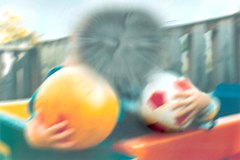Eylea (aflibercept) has been approved by the FDA for wet AMD (age-related macular degeneration). Wet (neovascular) AMD is one of the main causes of blindness or vision impairment in older Americans – by affecting the part of the eye that allows us to see fine detail (the macula), it destroys our sharp central vision. Such daily tasks as reading, writing and driving become more and more difficult.
Eylea has been approved at a dose of 2 mg once per month for the first 12 weeks, and then 2 mg once every two months.
The new intravitreal injection administration, as is done with Eylea, is known in scientific literature as VEGF Trap-Eye.
In most cases of wet AMD, although central vision can become severely affected, the patients’ peripheral vision still allows them to get about unaided.
There are two types of macular degeneration :
- Dry macular degeneration – this form progresses gradually. Although there is no treatment, things can be done to help the patient cope with it.
- Wet macular degeneration – this one progresses much more rapidly; it involves the growth of abnormal blood vessels (neovascularization) which leak fluid into the macula (center of the retina). Treatment is needed as soon as symptoms appear. One of the first symptoms includes seeing straight lines as wavy ones. This type is more serious than dry AMD.

How an AMD patient might see these two boys

How a person with good vision would see the two boys
Edward Cox, M.D., M.P.H, Director of the Office of Antimicrobial Products in FDA’s Center for Drug Evaluation and Research, said:
“Eylea is an important new treatment option for adults with wet AMD. It is a potentially blinding disease and the availability of new treatment options is important.”

The FDA evaluated two Phase 3 clinical studies which included 2,412 participants, all with wet AMD. They were randomly selected into two groups:
- The Eylea group – aflibercept injection into the eye, either once every four or eight weeks, administered by an ophthalmologist (specialist eye doctor)
- The Lucentis group – ranibizumab injection into the eye, also administered by an ophthalmologist
The primary endpoint in both cases was patients’ visual acuity (clearness of vision) after 12 months’ treatment. The primary endpoint means the “main result” measured at the end of a trial to determine whether a given treatment worked.
Both studies demonstrated that Eylea is as effective as Lucentis in either improving or maintaining visual acuity.
Among those in the Eylea group, the most common (reported) side effects included conjunctival hemorrhage (bleeding at injection site), eye pain, vitreous floaters (seeing spots floating around in one’s vision), cataract (clouding of the lens of the eye), and elevated eye pressure.
Patients with a currently active eye infection or ocular inflammation should not be given Eylea. No Eylea studies have been carried out on pregnant patients – the FDA says doctors should only use this medication for pregnant mothers if they are sure the potential benefits outweigh the potential risks. Eylea has not been studied in children (wet AMD is not a pediatric condition).
FDA-approved medications for wet AMD, apart from newly approved Eylea, include verteporfin for injection (Visudyne), pegaptanib sodium injection (Macugen), and ranibizumab injection (Lucentis).
Clinical ophthalmologist and retinal specialist, Jeffrey Heier, M.D., Chair of the Steering Committee for the VIEW 1 trial, said:
“The approval of EYLEA offers a much needed new treatment option for patients with wet AMD. EYLEA offers the potential of achieving the efficacy we’ve come to expect from current anti-VEGF agents, but with less frequent injections and no monitoring requirements. This may reduce the need for costly and time-consuming monthly office visits for patients and their caregivers.”
Eylea is marketed in the USA by Regeneron Pharmaceuticals Inc.
Leonard S. Schleifer, M.D., Ph.D., President and Chief Executive Officer of Regeneron, said:
“This approval is an important step forward for Regeneron and for patients suffering with wet AMD, the most common cause of blindness in the U.S. in older adults. We thank the patients and clinical investigators who participated in our clinical studies, the FDA, and the Regeneron employees who helped make this day possible. Now that EYLEA is approved, we plan to make EYLEA available to patients within the next few days.”
Written by Christian Nordqvist